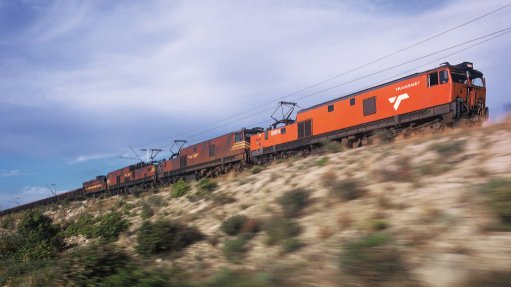South Africa must prioritise decarbonisation, as $1.5bn of exports to EU are at risk
South Africa should prioritise its decarbonisation strategy, as it has a carbon intensity much higher than most countries, and $1.5-billion of exports to the European Union (EU) are at risk in the short term.
That figure is likely to increase when more products are covered under the EU's Carbon Border Adjustment Mechanism (CBAM), said policy development research institution Trade and Industrial Policies Strategies (TIPS).
The EU is one of South Africa’s major export destinations, accounting for 19% of its total exports in 2019. The CBAM is a carbon border tax on embedded greenhouse-gas (GHG) emissions of carbon-intensive products imported into the EU.
The CBAM will mirror and function in parallel with the EU Emissions Trading Scheme and is intended to equalise the price of carbon between EU products and imports, thereby ensuring importers face similar conditions to EU manufacturers and that EU climate objectives are not undermined by carbon leakage, TIPS explained.
A transitional period will apply from October 2023 and CBAM will enter into force in 2026. In the transitional period, the burden will be administrative rather than financial, as importers will only report direct GHG emissions embedded in their imports.
Further, the new, provisionally agreed CBAM proposal includes both direct and indirect, such as from electricity consumption, GHG emissions and will be included after 2026. This is a problem for South Africa as the country is heavily reliant on coal-based power generation, which makes it one of the most carbon-intensive exporters, the policy institution said.
"The CBAM will have a negative impact on South Africa, along with other countries in the Global South. Carbon-intensive exports to the EU will become increasingly costly, owing to added carbon pricing and, therefore, increasingly uncompetitive. Companies from non-EU countries will have to proactively prepare for the CBAM and align their business models to a low-carbon future," TIPS researchers Valentia Monaisa and Seutame Maimele said.
AT-RISK INDUSTRIES
South Africa's iron and steel, and aluminium industries are particularly at risk. Similarly, the organic chemicals and plastics industries are also in jeopardy, although their inclusion in the CBAM is still to be confirmed after the transitional period.
The risk for chemical fertilisers as well as cement is marginal, as the EU accounts for less than 1% of South African exports for both sectors, the institution said.
"Iron and steel exports face significant risk. About 26% in value of products included in the CBAM are exported to the EU, and iron and steel exports covered by the CBAM accounted for 4% of total South African exports in 2021."
Further, aluminium production, particularly primary aluminium, is highly energy intensive. The export risk is also high as about 25% of the products covered in the CBAM are exported to the EU. Aluminium exports covered by the CBAM accounted for 1% of total South African exports in 2021.
Additionally, the organic chemicals sector’s exposure to the CBAM is high, as about 30% in value of the products covered by the CBAM were exported to the EU in 2021. Organic chemicals exports covered by the CBAM accounted for 1% of total South African exports in 2021.
The largest contributors to GHG emissions in the sector are ammonia production and nitric acid production. South Africa’s chemicals and pharmaceutical products exports are also more carbon-intensive than most other countries, the TIPS policy brief noted.
Further, the exposure of plastic exports to the CBAM is high, as about 10% in value of the products covered by the CBAM were exported to the EU in 2021. Plastics exports covered by the CBAM accounted for 1% of South Africa’s total exports in 2021.
The carbon intensity of South Africa’s rubber and plastics products is also comparatively highly carbon intensive, the researchers highlighted.
DECARBONISATION
In the future, more products and sectors are expected to be included in the CBAM. This will place more South African exports at risk.
In terms of carbon intensity, South Africa’s manufacturing exports are an outlier. Compared with other countries, in 2015, South Africa was the only country with an export carbon intensity of more than two-billion tons of carbon dioxide equivalent (tCO2e) per $1-million. The majority of countries are spread from about 300-million to 1.1-billion tCO2e per $1-million.
"This places South Africa’s manufacturing exports particularly at risk of climate change policies, such as the CBAM," TIPS said.
Therefore, firms need to actively investigate low-carbon energy sources and shift their production methods to align with a low-carbon future. The South African government has to increase efforts to decarbonise the electricity mix and reform the carbon tax to reflect international carbon pricing, TIPS advised.
Other markets, such as Canada, the UK and Japan, are planning to implement their own border carbon taxes. This will make trade increasingly difficult for South Africa if it does not decarbonise its energy and its carbon-intensive industries.
"Additionally, as the capacity for tracking and reporting carbon content differ by industry, a domestic carbon reporting system, which could be led by the Department of Forestry, Fisheries and the Environment, could ease the administrative burden of South African firms.
"The reporting requirements could also facilitate the design and adoption of standardised carbon accounting methodologies and reports. These standardised carbon accounting methodologies could potentially have benefits for enabling climate policies to be deployed more effectively," the researchers noted.
Additionally, reforming South Africa’s carbon tax to reflect global carbon pricing will be critical to ensure that the country’s carbon-intensive products reflect, at least, the EU price of carbon. Increasing the South African carbon price will stimulate heavy emitters to reform their business models and operations, as well as reduce the exposure to the CBAM, TIPS added.
"However, countries with domestic carbon pricing and strict carbon policies could see some level of exemption from the CBAM.
"South Africa’s current climate change policies are not ambitious by global standards, and an ambitious national climate change policy, most notably carbon pricing, is required to steer the country towards a low-carbon development trajectory and receive some meaningful relief from the CBAM.
"South Africa’s over-reliance on coal as a feedstock for electricity and liquid fuels production makes it one of the most carbon-intensive economies in the world. Increasing renewable energy in the national grid will decrease the indirect emissions of all sectors.
"Companies and governments should accelerate the decarbonisation of carbon-intensive industries by increasing renewable energy-based distributed generation in production processes and investing in energy-efficient technologies.
Comments
Announcements
What's On
Subscribe to improve your user experience...
Option 1 (equivalent of R125 a month):
Receive a weekly copy of Creamer Media's Engineering News & Mining Weekly magazine
(print copy for those in South Africa and e-magazine for those outside of South Africa)
Receive daily email newsletters
Access to full search results
Access archive of magazine back copies
Access to Projects in Progress
Access to ONE Research Report of your choice in PDF format
Option 2 (equivalent of R375 a month):
All benefits from Option 1
PLUS
Access to Creamer Media's Research Channel Africa for ALL Research Reports, in PDF format, on various industrial and mining sectors
including Electricity; Water; Energy Transition; Hydrogen; Roads, Rail and Ports; Coal; Gold; Platinum; Battery Metals; etc.
Already a subscriber?
Forgotten your password?
Receive weekly copy of Creamer Media's Engineering News & Mining Weekly magazine (print copy for those in South Africa and e-magazine for those outside of South Africa)
➕
Recieve daily email newsletters
➕
Access to full search results
➕
Access archive of magazine back copies
➕
Access to Projects in Progress
➕
Access to ONE Research Report of your choice in PDF format
RESEARCH CHANNEL AFRICA
R4500 (equivalent of R375 a month)
SUBSCRIBEAll benefits from Option 1
➕
Access to Creamer Media's Research Channel Africa for ALL Research Reports on various industrial and mining sectors, in PDF format, including on:
Electricity
➕
Water
➕
Energy Transition
➕
Hydrogen
➕
Roads, Rail and Ports
➕
Coal
➕
Gold
➕
Platinum
➕
Battery Metals
➕
etc.
Receive all benefits from Option 1 or Option 2 delivered to numerous people at your company
➕
Multiple User names and Passwords for simultaneous log-ins
➕
Intranet integration access to all in your organisation


















